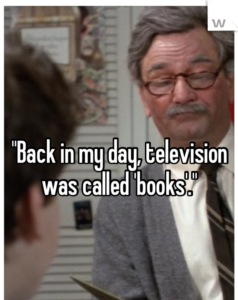I mentioned in an earlier post that there are probably writing forms that your young writers have never heard of, but which might be the key to unlocking their writing. Conversely, there might be genres of storytelling which your young writers are familiar with that you’ve never heard of or thought of as stories.
We’re so used to rolling our eyes at ‘screen time’ that I think we tend to pit it in direct opposition to all that’s good and holy, (i.e. page time).

But TV, movies, comics, video games and D&D are all forms of storytelling. If you actually play any of those fantasy computer games, you quickly realise they have more complicated world buildings and casts than Lord of the Rings. And story structure is surprisingly universal across all these forms of storytelling so you can learn a lot from all of them.
And someone has to write all those computer games, and it isn’t robots or programmers who’ve never read a book, it’s quite often published fiction writers who create this stuff. (Joanne Harris, who wrote Chocolat, has written for computer games.)
If your writers are interested in writing for computer games, there’s an article about it here.
And 4 articles about Game Writing here.
So when my young writers go off on a rant about the latest computer game or their last D&D game I just try to keep up. Sometimes this involves a lot of smiling and nodding on my part but I’d never suggest to them that the place they get their stories from isn’t as good as the place I get mine.
They can even inspire them to write! Fan fiction (Fan Fic) means using existing characters from novels, TV, movies, games etc and writing stories about them and it’s another thing that gets looked down on, as though it’s not proper creativity. Like they’ve turned up on Bake Off with frozen filo.

It’s not plagiarism (authors have no problem with Fan Fic of their work, as long as no one’s trying to cash in on it) and it’s not lazy. Much like frozen filo, it’s a way in for the nervous writer. With the characters and world-building taken care of, they can focus on creating beautiful sentences and intricate plots.
And it’s a sign that they’ve deeply engaged with fictional people and they don’t want the story to end. I think that’s wonderful and it’s what stories at their best do.

In Stephen King’s famous book on writing, On Writing (clever title there, Steve), he remembers being asked by a teacher when he was a kid why he was wasting his god given talent on ‘junk’. Junk being sci-fi/horror/fantasy. He carried the guilt of that for years, feeling he was wasting his time on horror, playing down his own achievements because they were ‘just’ genre fiction. Stephen King!
I hope we’re a bit more enlightened now, but are we treating things like Fan Fic, movies, TV and gaming like our grandparents would have treated Sci-Fi in our terror lest books go out of fashion?
Fan Fic can be as creative as any other writing and there are loads of websites dedicated to it where you can post your stories and other people can follow you and post comments. I have one writer who posts a lot and has thousands of readers, which is a real boost for her confidence.
And if you’re worried that your students never seem to read books, just ask them if they’re reading any Fan Fic. Many of my young writers spend HOURS every week reading Fan Fic, but we think they’re not reading at all just because it’s just not on our radar. At our group last night someone wrote a poem inspired by a novel they read on a Fan Fic site!

So if your writers are struggling to get started in their writing, you could suggest they take their favourite characters from a book or TV and put them in a story. And direct them to some Fan Fic sites if they want to post online or read some Fan Fic.
I went to the experts and asked my young writers to recommend the best Fan Fic sites and this is what they said:
Archive of our own (AO3) – This was their favourite. You can read and publish Fan Fic or original stuff. It’s free and easy to use.
Quotev – Much like AO3 but doesn’t have an advanced tagging system.
Wattpad – This got mixed reviews. It seems to be for younger writers but they felt it didn’t handle warnings for ‘adult content’ as well as other sites.
Fanfiction.net – They were not impressed with this one.
I asked them about the risk of ‘trolling’ and negative comments from users but they said that, while it does sometimes happen, it’s rare and the Fan Fic communities tend to be kind and supportive and will jump all over trolls.
I also asked about adult content. Adults do write for these sites too, so there could be adult content, and there’s no way to set parental controls, but writers tag their stories with ‘ratings’ and ‘warnings’ to guide readers, and my writers felt it wasn’t a problem, you just avoid anything marked ‘adult’. But just be aware of this if you’re introducing them to the sites. (But they don’t need to use the sites to write their own.)
This article is another helpful guide to the issues and the lingo for parents and educators.
So who would you write Fan Fic about? What story did you not want to end?
